Analysis of Intelligent Systems for Data Warehouse Systems: MITS5509
VerifiedAdded on 2022/09/07
|8
|2190
|15
Report
AI Summary
This research paper reviews an article analyzing the key success factors for implementing business intelligence systems in data warehouses. The paper employs a qualitative research design, utilizing literature reviews and interviews for data collection and analysis. The study explores the intentions of the original article, the research methods employed, including content analysis, and the problems highlighted by the authors. The findings emphasize the importance of organizational support, project management, and system-related technologies in successful business intelligence system implementation. The report concludes that intelligent systems are beneficial for effective decision-making and data management within data warehouses, advocating for their adoption by businesses to improve operational efficiency. The paper highlights the interconnection between intelligent systems and data warehouses, emphasizing the role of enterprise structure in the successful implementation of these systems, offering insights into factors like maturity procedure and knowledge transfer within the context of enterprise systems.

RESEARCH PAPER 0
Article Name: N., Denic, V., Vujovic, S. Filic And, B., Spasic, “Analysis of key success factors for
business intelligence systems implementation,” structure, vol. 42, no.6, p.30, 2016.
Intelligent Systems for Data
Warehouse systems
Article Name: N., Denic, V., Vujovic, S. Filic And, B., Spasic, “Analysis of key success factors for
business intelligence systems implementation,” structure, vol. 42, no.6, p.30, 2016.
Intelligent Systems for Data
Warehouse systems
Paraphrase This Document
Need a fresh take? Get an instant paraphrase of this document with our AI Paraphraser

RESEARCH PAPER 1
Table of Contents
Introduction.................................................................................................................................................2
The intention of the paper............................................................................................................................2
Research methods........................................................................................................................................3
Research design.......................................................................................................................................3
Research strategy.....................................................................................................................................3
Data collection.........................................................................................................................................4
Data analysis...........................................................................................................................................4
Problems decorated by the writers...............................................................................................................4
Results and findings....................................................................................................................................4
Conclusion of the paper...............................................................................................................................5
Conclusion...................................................................................................................................................6
References...................................................................................................................................................7
Table of Contents
Introduction.................................................................................................................................................2
The intention of the paper............................................................................................................................2
Research methods........................................................................................................................................3
Research design.......................................................................................................................................3
Research strategy.....................................................................................................................................3
Data collection.........................................................................................................................................4
Data analysis...........................................................................................................................................4
Problems decorated by the writers...............................................................................................................4
Results and findings....................................................................................................................................4
Conclusion of the paper...............................................................................................................................5
Conclusion...................................................................................................................................................6
References...................................................................................................................................................7
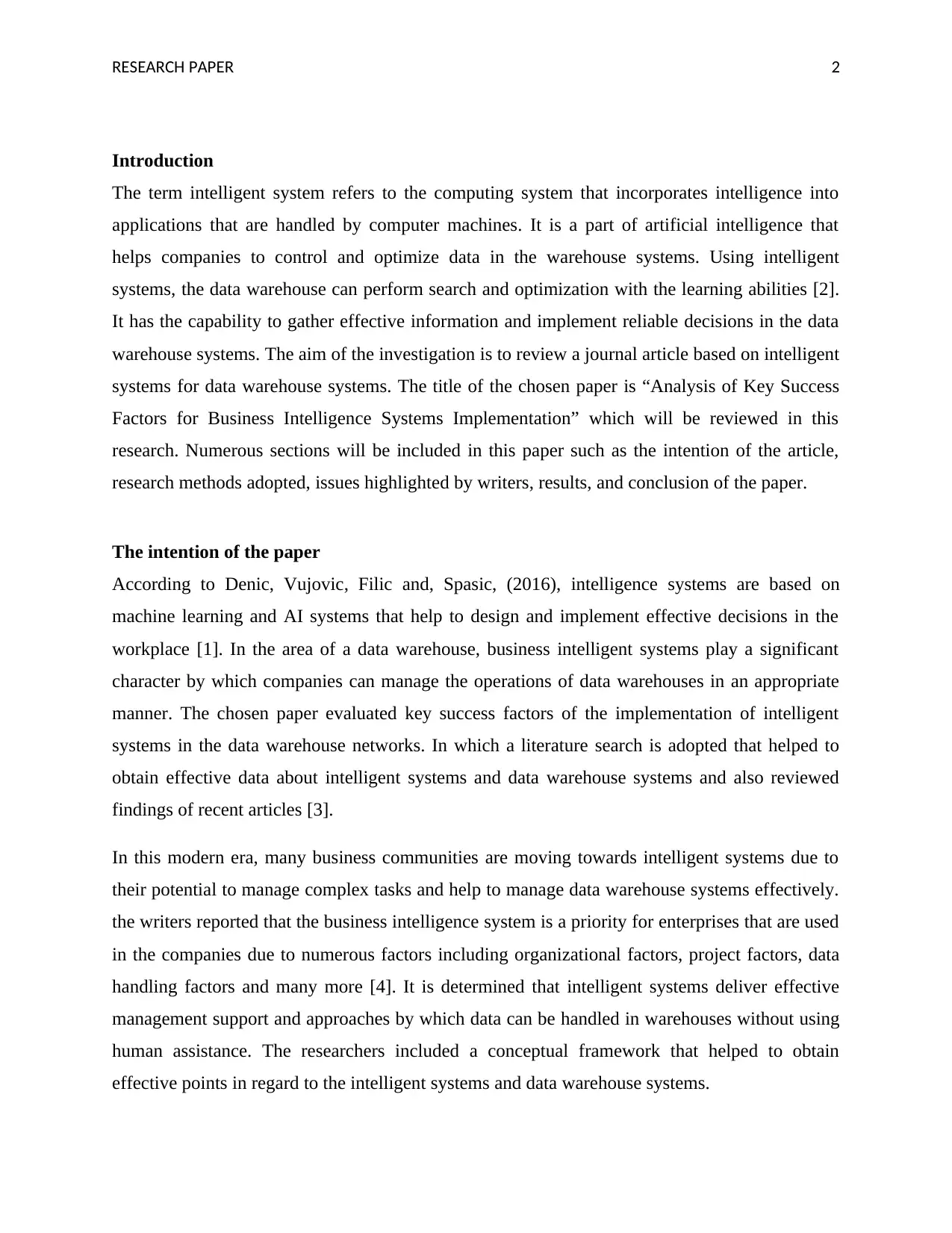
RESEARCH PAPER 2
Introduction
The term intelligent system refers to the computing system that incorporates intelligence into
applications that are handled by computer machines. It is a part of artificial intelligence that
helps companies to control and optimize data in the warehouse systems. Using intelligent
systems, the data warehouse can perform search and optimization with the learning abilities [2].
It has the capability to gather effective information and implement reliable decisions in the data
warehouse systems. The aim of the investigation is to review a journal article based on intelligent
systems for data warehouse systems. The title of the chosen paper is “Analysis of Key Success
Factors for Business Intelligence Systems Implementation” which will be reviewed in this
research. Numerous sections will be included in this paper such as the intention of the article,
research methods adopted, issues highlighted by writers, results, and conclusion of the paper.
The intention of the paper
According to Denic, Vujovic, Filic and, Spasic, (2016), intelligence systems are based on
machine learning and AI systems that help to design and implement effective decisions in the
workplace [1]. In the area of a data warehouse, business intelligent systems play a significant
character by which companies can manage the operations of data warehouses in an appropriate
manner. The chosen paper evaluated key success factors of the implementation of intelligent
systems in the data warehouse networks. In which a literature search is adopted that helped to
obtain effective data about intelligent systems and data warehouse systems and also reviewed
findings of recent articles [3].
In this modern era, many business communities are moving towards intelligent systems due to
their potential to manage complex tasks and help to manage data warehouse systems effectively.
the writers reported that the business intelligence system is a priority for enterprises that are used
in the companies due to numerous factors including organizational factors, project factors, data
handling factors and many more [4]. It is determined that intelligent systems deliver effective
management support and approaches by which data can be handled in warehouses without using
human assistance. The researchers included a conceptual framework that helped to obtain
effective points in regard to the intelligent systems and data warehouse systems.
Introduction
The term intelligent system refers to the computing system that incorporates intelligence into
applications that are handled by computer machines. It is a part of artificial intelligence that
helps companies to control and optimize data in the warehouse systems. Using intelligent
systems, the data warehouse can perform search and optimization with the learning abilities [2].
It has the capability to gather effective information and implement reliable decisions in the data
warehouse systems. The aim of the investigation is to review a journal article based on intelligent
systems for data warehouse systems. The title of the chosen paper is “Analysis of Key Success
Factors for Business Intelligence Systems Implementation” which will be reviewed in this
research. Numerous sections will be included in this paper such as the intention of the article,
research methods adopted, issues highlighted by writers, results, and conclusion of the paper.
The intention of the paper
According to Denic, Vujovic, Filic and, Spasic, (2016), intelligence systems are based on
machine learning and AI systems that help to design and implement effective decisions in the
workplace [1]. In the area of a data warehouse, business intelligent systems play a significant
character by which companies can manage the operations of data warehouses in an appropriate
manner. The chosen paper evaluated key success factors of the implementation of intelligent
systems in the data warehouse networks. In which a literature search is adopted that helped to
obtain effective data about intelligent systems and data warehouse systems and also reviewed
findings of recent articles [3].
In this modern era, many business communities are moving towards intelligent systems due to
their potential to manage complex tasks and help to manage data warehouse systems effectively.
the writers reported that the business intelligence system is a priority for enterprises that are used
in the companies due to numerous factors including organizational factors, project factors, data
handling factors and many more [4]. It is determined that intelligent systems deliver effective
management support and approaches by which data can be handled in warehouses without using
human assistance. The researchers included a conceptual framework that helped to obtain
effective points in regard to the intelligent systems and data warehouse systems.
⊘ This is a preview!⊘
Do you want full access?
Subscribe today to unlock all pages.

Trusted by 1+ million students worldwide
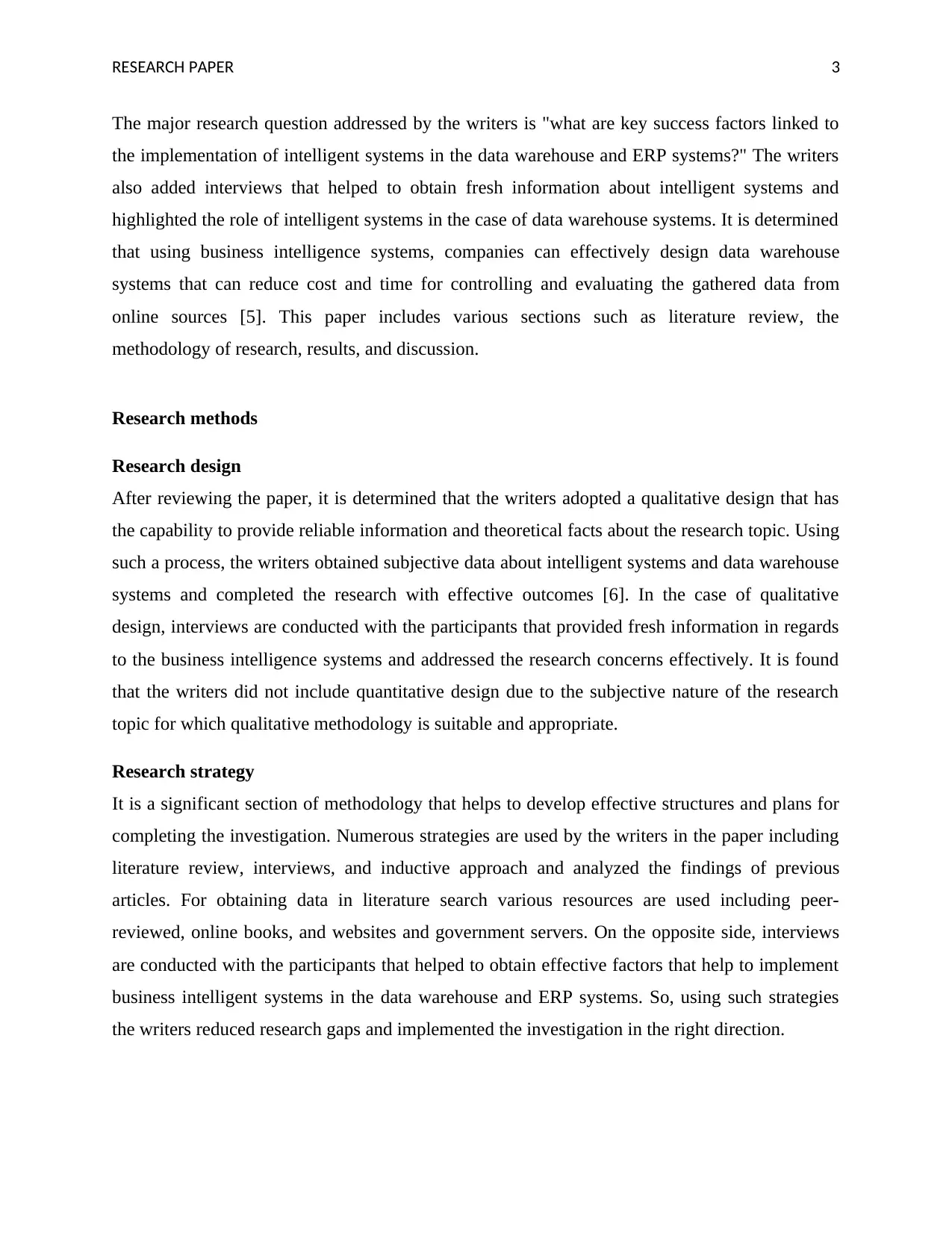
RESEARCH PAPER 3
The major research question addressed by the writers is "what are key success factors linked to
the implementation of intelligent systems in the data warehouse and ERP systems?" The writers
also added interviews that helped to obtain fresh information about intelligent systems and
highlighted the role of intelligent systems in the case of data warehouse systems. It is determined
that using business intelligence systems, companies can effectively design data warehouse
systems that can reduce cost and time for controlling and evaluating the gathered data from
online sources [5]. This paper includes various sections such as literature review, the
methodology of research, results, and discussion.
Research methods
Research design
After reviewing the paper, it is determined that the writers adopted a qualitative design that has
the capability to provide reliable information and theoretical facts about the research topic. Using
such a process, the writers obtained subjective data about intelligent systems and data warehouse
systems and completed the research with effective outcomes [6]. In the case of qualitative
design, interviews are conducted with the participants that provided fresh information in regards
to the business intelligence systems and addressed the research concerns effectively. It is found
that the writers did not include quantitative design due to the subjective nature of the research
topic for which qualitative methodology is suitable and appropriate.
Research strategy
It is a significant section of methodology that helps to develop effective structures and plans for
completing the investigation. Numerous strategies are used by the writers in the paper including
literature review, interviews, and inductive approach and analyzed the findings of previous
articles. For obtaining data in literature search various resources are used including peer-
reviewed, online books, and websites and government servers. On the opposite side, interviews
are conducted with the participants that helped to obtain effective factors that help to implement
business intelligent systems in the data warehouse and ERP systems. So, using such strategies
the writers reduced research gaps and implemented the investigation in the right direction.
The major research question addressed by the writers is "what are key success factors linked to
the implementation of intelligent systems in the data warehouse and ERP systems?" The writers
also added interviews that helped to obtain fresh information about intelligent systems and
highlighted the role of intelligent systems in the case of data warehouse systems. It is determined
that using business intelligence systems, companies can effectively design data warehouse
systems that can reduce cost and time for controlling and evaluating the gathered data from
online sources [5]. This paper includes various sections such as literature review, the
methodology of research, results, and discussion.
Research methods
Research design
After reviewing the paper, it is determined that the writers adopted a qualitative design that has
the capability to provide reliable information and theoretical facts about the research topic. Using
such a process, the writers obtained subjective data about intelligent systems and data warehouse
systems and completed the research with effective outcomes [6]. In the case of qualitative
design, interviews are conducted with the participants that provided fresh information in regards
to the business intelligence systems and addressed the research concerns effectively. It is found
that the writers did not include quantitative design due to the subjective nature of the research
topic for which qualitative methodology is suitable and appropriate.
Research strategy
It is a significant section of methodology that helps to develop effective structures and plans for
completing the investigation. Numerous strategies are used by the writers in the paper including
literature review, interviews, and inductive approach and analyzed the findings of previous
articles. For obtaining data in literature search various resources are used including peer-
reviewed, online books, and websites and government servers. On the opposite side, interviews
are conducted with the participants that helped to obtain effective factors that help to implement
business intelligent systems in the data warehouse and ERP systems. So, using such strategies
the writers reduced research gaps and implemented the investigation in the right direction.
Paraphrase This Document
Need a fresh take? Get an instant paraphrase of this document with our AI Paraphraser
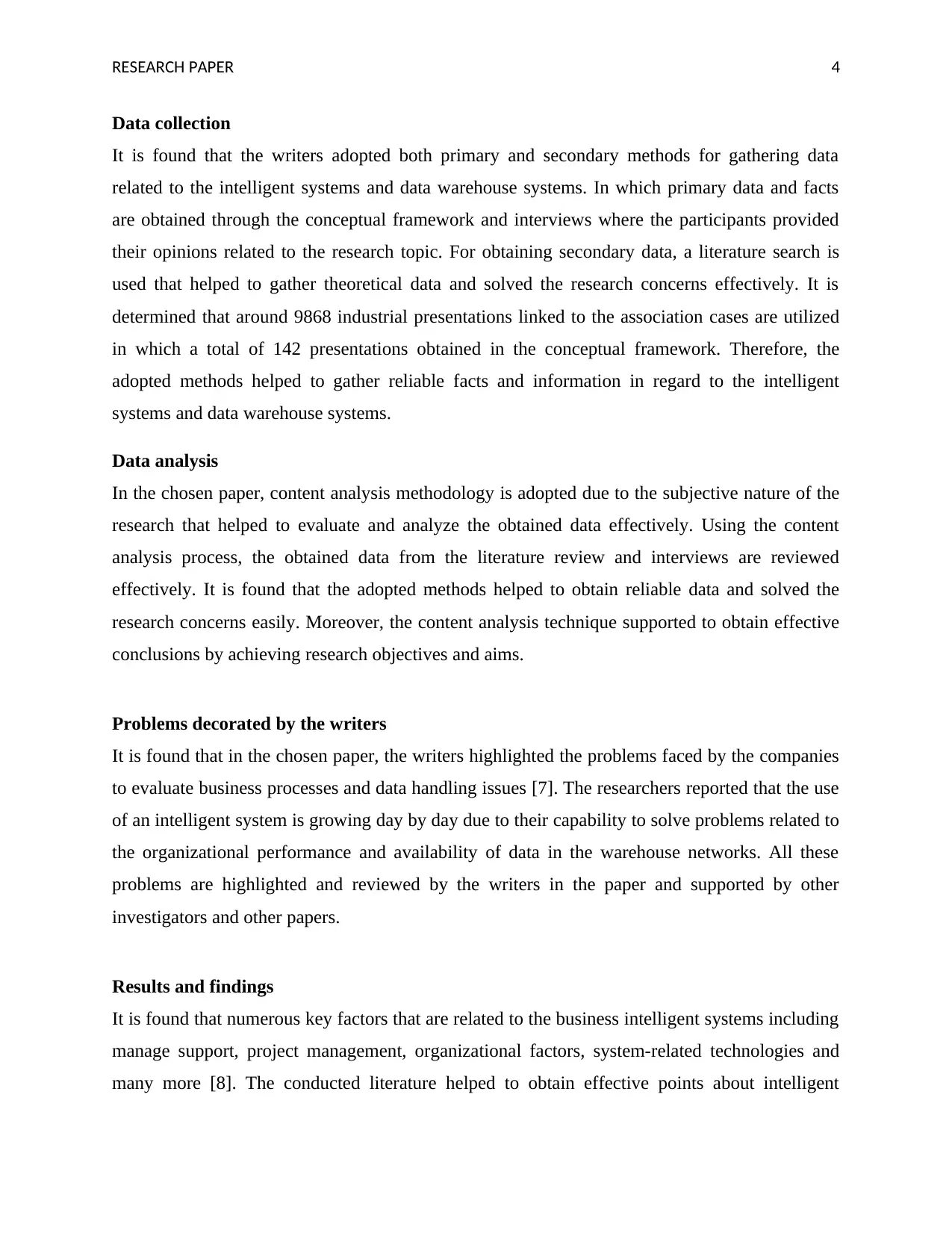
RESEARCH PAPER 4
Data collection
It is found that the writers adopted both primary and secondary methods for gathering data
related to the intelligent systems and data warehouse systems. In which primary data and facts
are obtained through the conceptual framework and interviews where the participants provided
their opinions related to the research topic. For obtaining secondary data, a literature search is
used that helped to gather theoretical data and solved the research concerns effectively. It is
determined that around 9868 industrial presentations linked to the association cases are utilized
in which a total of 142 presentations obtained in the conceptual framework. Therefore, the
adopted methods helped to gather reliable facts and information in regard to the intelligent
systems and data warehouse systems.
Data analysis
In the chosen paper, content analysis methodology is adopted due to the subjective nature of the
research that helped to evaluate and analyze the obtained data effectively. Using the content
analysis process, the obtained data from the literature review and interviews are reviewed
effectively. It is found that the adopted methods helped to obtain reliable data and solved the
research concerns easily. Moreover, the content analysis technique supported to obtain effective
conclusions by achieving research objectives and aims.
Problems decorated by the writers
It is found that in the chosen paper, the writers highlighted the problems faced by the companies
to evaluate business processes and data handling issues [7]. The researchers reported that the use
of an intelligent system is growing day by day due to their capability to solve problems related to
the organizational performance and availability of data in the warehouse networks. All these
problems are highlighted and reviewed by the writers in the paper and supported by other
investigators and other papers.
Results and findings
It is found that numerous key factors that are related to the business intelligent systems including
manage support, project management, organizational factors, system-related technologies and
many more [8]. The conducted literature helped to obtain effective points about intelligent
Data collection
It is found that the writers adopted both primary and secondary methods for gathering data
related to the intelligent systems and data warehouse systems. In which primary data and facts
are obtained through the conceptual framework and interviews where the participants provided
their opinions related to the research topic. For obtaining secondary data, a literature search is
used that helped to gather theoretical data and solved the research concerns effectively. It is
determined that around 9868 industrial presentations linked to the association cases are utilized
in which a total of 142 presentations obtained in the conceptual framework. Therefore, the
adopted methods helped to gather reliable facts and information in regard to the intelligent
systems and data warehouse systems.
Data analysis
In the chosen paper, content analysis methodology is adopted due to the subjective nature of the
research that helped to evaluate and analyze the obtained data effectively. Using the content
analysis process, the obtained data from the literature review and interviews are reviewed
effectively. It is found that the adopted methods helped to obtain reliable data and solved the
research concerns easily. Moreover, the content analysis technique supported to obtain effective
conclusions by achieving research objectives and aims.
Problems decorated by the writers
It is found that in the chosen paper, the writers highlighted the problems faced by the companies
to evaluate business processes and data handling issues [7]. The researchers reported that the use
of an intelligent system is growing day by day due to their capability to solve problems related to
the organizational performance and availability of data in the warehouse networks. All these
problems are highlighted and reviewed by the writers in the paper and supported by other
investigators and other papers.
Results and findings
It is found that numerous key factors that are related to the business intelligent systems including
manage support, project management, organizational factors, system-related technologies and
many more [8]. The conducted literature helped to obtain effective points about intelligent
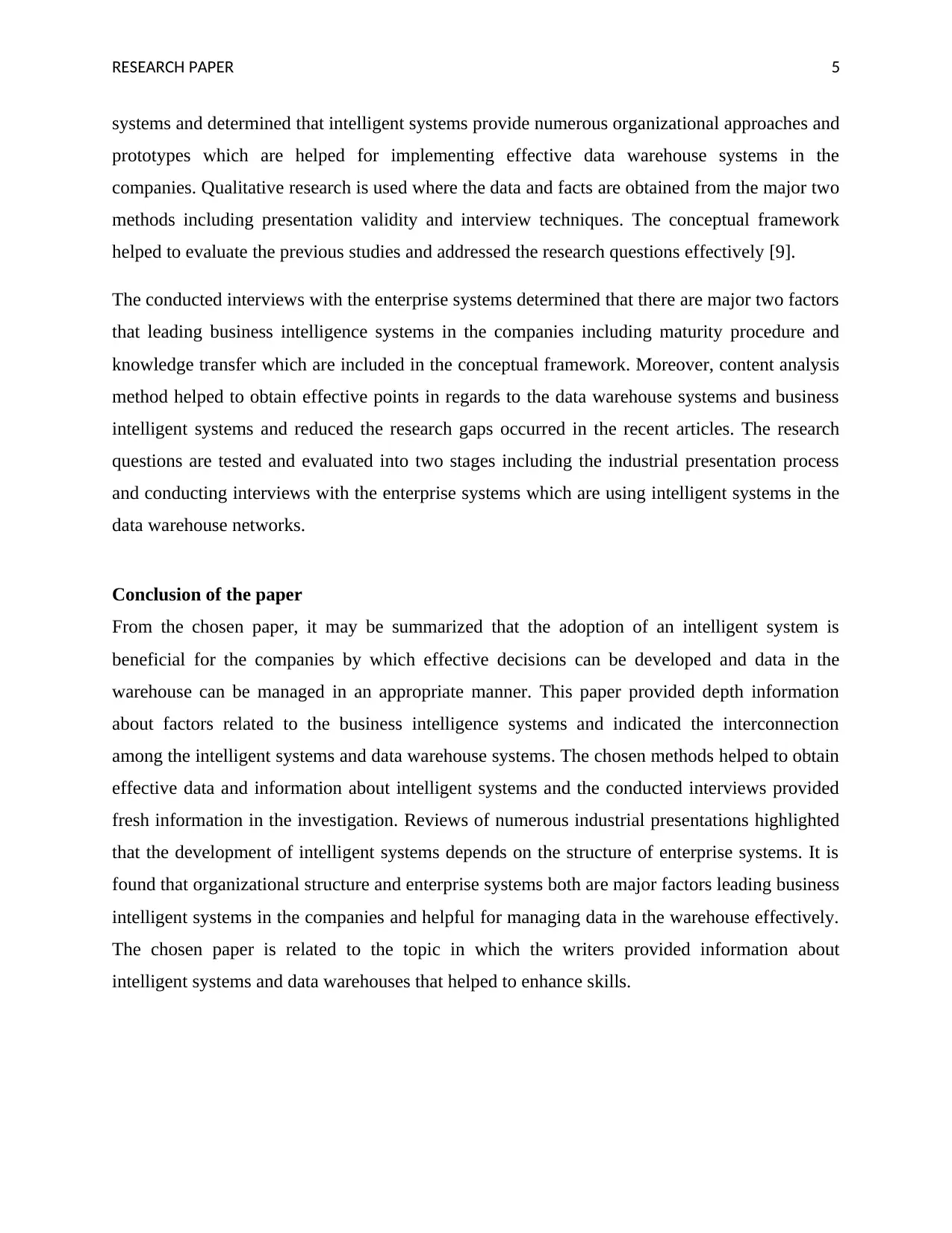
RESEARCH PAPER 5
systems and determined that intelligent systems provide numerous organizational approaches and
prototypes which are helped for implementing effective data warehouse systems in the
companies. Qualitative research is used where the data and facts are obtained from the major two
methods including presentation validity and interview techniques. The conceptual framework
helped to evaluate the previous studies and addressed the research questions effectively [9].
The conducted interviews with the enterprise systems determined that there are major two factors
that leading business intelligence systems in the companies including maturity procedure and
knowledge transfer which are included in the conceptual framework. Moreover, content analysis
method helped to obtain effective points in regards to the data warehouse systems and business
intelligent systems and reduced the research gaps occurred in the recent articles. The research
questions are tested and evaluated into two stages including the industrial presentation process
and conducting interviews with the enterprise systems which are using intelligent systems in the
data warehouse networks.
Conclusion of the paper
From the chosen paper, it may be summarized that the adoption of an intelligent system is
beneficial for the companies by which effective decisions can be developed and data in the
warehouse can be managed in an appropriate manner. This paper provided depth information
about factors related to the business intelligence systems and indicated the interconnection
among the intelligent systems and data warehouse systems. The chosen methods helped to obtain
effective data and information about intelligent systems and the conducted interviews provided
fresh information in the investigation. Reviews of numerous industrial presentations highlighted
that the development of intelligent systems depends on the structure of enterprise systems. It is
found that organizational structure and enterprise systems both are major factors leading business
intelligent systems in the companies and helpful for managing data in the warehouse effectively.
The chosen paper is related to the topic in which the writers provided information about
intelligent systems and data warehouses that helped to enhance skills.
systems and determined that intelligent systems provide numerous organizational approaches and
prototypes which are helped for implementing effective data warehouse systems in the
companies. Qualitative research is used where the data and facts are obtained from the major two
methods including presentation validity and interview techniques. The conceptual framework
helped to evaluate the previous studies and addressed the research questions effectively [9].
The conducted interviews with the enterprise systems determined that there are major two factors
that leading business intelligence systems in the companies including maturity procedure and
knowledge transfer which are included in the conceptual framework. Moreover, content analysis
method helped to obtain effective points in regards to the data warehouse systems and business
intelligent systems and reduced the research gaps occurred in the recent articles. The research
questions are tested and evaluated into two stages including the industrial presentation process
and conducting interviews with the enterprise systems which are using intelligent systems in the
data warehouse networks.
Conclusion of the paper
From the chosen paper, it may be summarized that the adoption of an intelligent system is
beneficial for the companies by which effective decisions can be developed and data in the
warehouse can be managed in an appropriate manner. This paper provided depth information
about factors related to the business intelligence systems and indicated the interconnection
among the intelligent systems and data warehouse systems. The chosen methods helped to obtain
effective data and information about intelligent systems and the conducted interviews provided
fresh information in the investigation. Reviews of numerous industrial presentations highlighted
that the development of intelligent systems depends on the structure of enterprise systems. It is
found that organizational structure and enterprise systems both are major factors leading business
intelligent systems in the companies and helpful for managing data in the warehouse effectively.
The chosen paper is related to the topic in which the writers provided information about
intelligent systems and data warehouses that helped to enhance skills.
⊘ This is a preview!⊘
Do you want full access?
Subscribe today to unlock all pages.

Trusted by 1+ million students worldwide
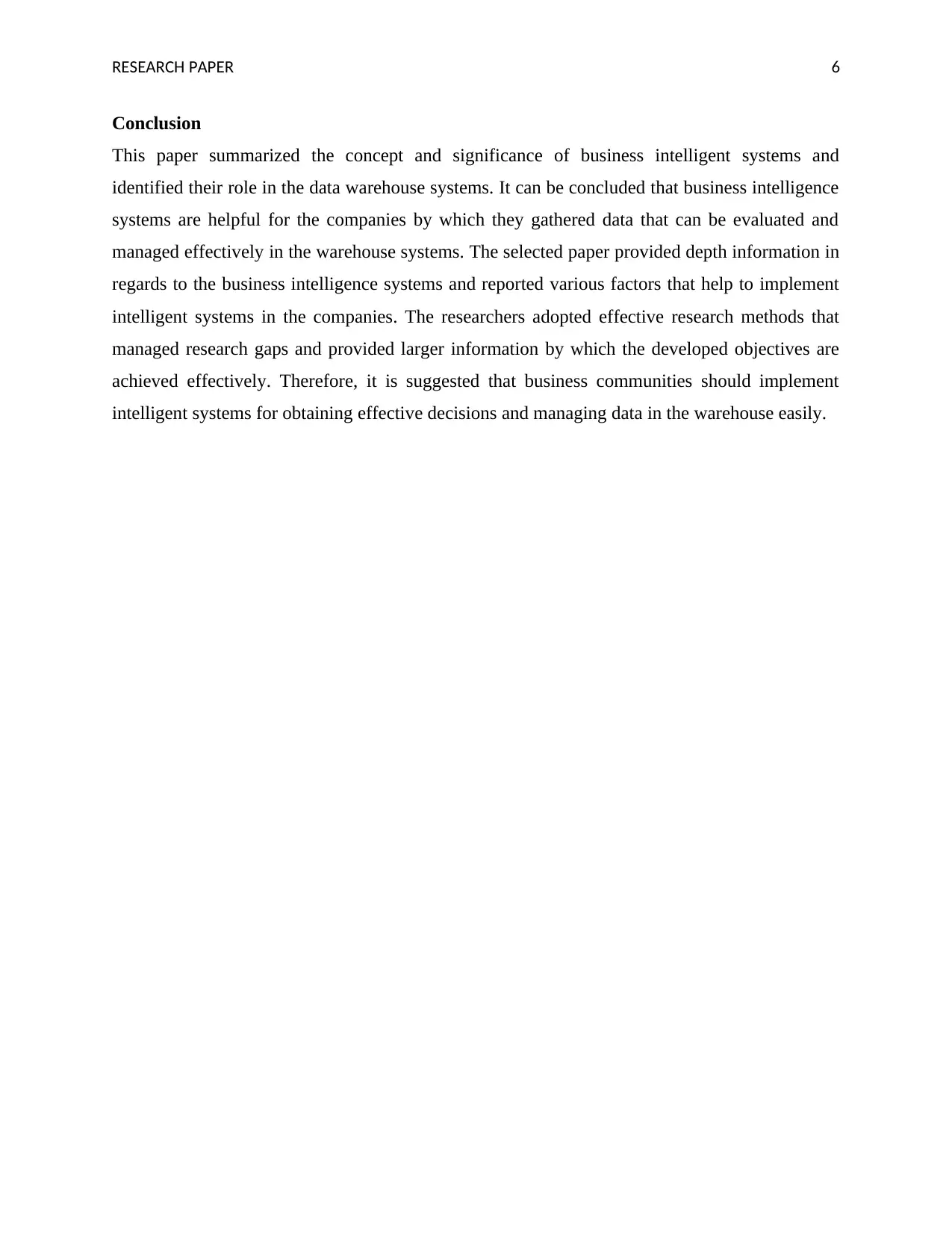
RESEARCH PAPER 6
Conclusion
This paper summarized the concept and significance of business intelligent systems and
identified their role in the data warehouse systems. It can be concluded that business intelligence
systems are helpful for the companies by which they gathered data that can be evaluated and
managed effectively in the warehouse systems. The selected paper provided depth information in
regards to the business intelligence systems and reported various factors that help to implement
intelligent systems in the companies. The researchers adopted effective research methods that
managed research gaps and provided larger information by which the developed objectives are
achieved effectively. Therefore, it is suggested that business communities should implement
intelligent systems for obtaining effective decisions and managing data in the warehouse easily.
Conclusion
This paper summarized the concept and significance of business intelligent systems and
identified their role in the data warehouse systems. It can be concluded that business intelligence
systems are helpful for the companies by which they gathered data that can be evaluated and
managed effectively in the warehouse systems. The selected paper provided depth information in
regards to the business intelligence systems and reported various factors that help to implement
intelligent systems in the companies. The researchers adopted effective research methods that
managed research gaps and provided larger information by which the developed objectives are
achieved effectively. Therefore, it is suggested that business communities should implement
intelligent systems for obtaining effective decisions and managing data in the warehouse easily.
Paraphrase This Document
Need a fresh take? Get an instant paraphrase of this document with our AI Paraphraser
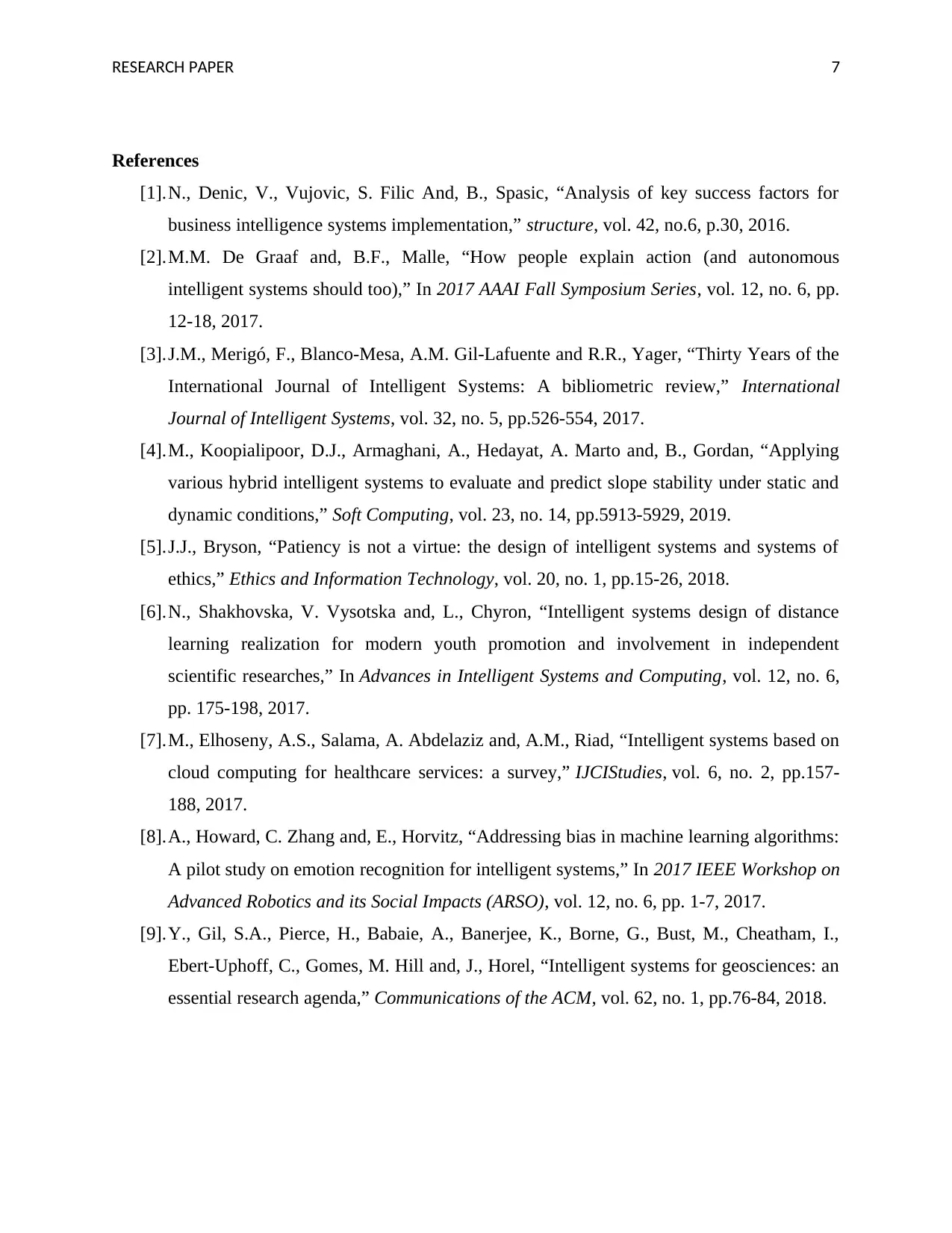
RESEARCH PAPER 7
References
[1].N., Denic, V., Vujovic, S. Filic And, B., Spasic, “Analysis of key success factors for
business intelligence systems implementation,” structure, vol. 42, no.6, p.30, 2016.
[2].M.M. De Graaf and, B.F., Malle, “How people explain action (and autonomous
intelligent systems should too),” In 2017 AAAI Fall Symposium Series, vol. 12, no. 6, pp.
12-18, 2017.
[3].J.M., Merigó, F., Blanco‐Mesa, A.M. Gil‐Lafuente and R.R., Yager, “Thirty Years of the
International Journal of Intelligent Systems: A bibliometric review,” International
Journal of Intelligent Systems, vol. 32, no. 5, pp.526-554, 2017.
[4].M., Koopialipoor, D.J., Armaghani, A., Hedayat, A. Marto and, B., Gordan, “Applying
various hybrid intelligent systems to evaluate and predict slope stability under static and
dynamic conditions,” Soft Computing, vol. 23, no. 14, pp.5913-5929, 2019.
[5].J.J., Bryson, “Patiency is not a virtue: the design of intelligent systems and systems of
ethics,” Ethics and Information Technology, vol. 20, no. 1, pp.15-26, 2018.
[6].N., Shakhovska, V. Vysotska and, L., Chyron, “Intelligent systems design of distance
learning realization for modern youth promotion and involvement in independent
scientific researches,” In Advances in Intelligent Systems and Computing, vol. 12, no. 6,
pp. 175-198, 2017.
[7].M., Elhoseny, A.S., Salama, A. Abdelaziz and, A.M., Riad, “Intelligent systems based on
cloud computing for healthcare services: a survey,” IJCIStudies, vol. 6, no. 2, pp.157-
188, 2017.
[8].A., Howard, C. Zhang and, E., Horvitz, “Addressing bias in machine learning algorithms:
A pilot study on emotion recognition for intelligent systems,” In 2017 IEEE Workshop on
Advanced Robotics and its Social Impacts (ARSO), vol. 12, no. 6, pp. 1-7, 2017.
[9].Y., Gil, S.A., Pierce, H., Babaie, A., Banerjee, K., Borne, G., Bust, M., Cheatham, I.,
Ebert-Uphoff, C., Gomes, M. Hill and, J., Horel, “Intelligent systems for geosciences: an
essential research agenda,” Communications of the ACM, vol. 62, no. 1, pp.76-84, 2018.
References
[1].N., Denic, V., Vujovic, S. Filic And, B., Spasic, “Analysis of key success factors for
business intelligence systems implementation,” structure, vol. 42, no.6, p.30, 2016.
[2].M.M. De Graaf and, B.F., Malle, “How people explain action (and autonomous
intelligent systems should too),” In 2017 AAAI Fall Symposium Series, vol. 12, no. 6, pp.
12-18, 2017.
[3].J.M., Merigó, F., Blanco‐Mesa, A.M. Gil‐Lafuente and R.R., Yager, “Thirty Years of the
International Journal of Intelligent Systems: A bibliometric review,” International
Journal of Intelligent Systems, vol. 32, no. 5, pp.526-554, 2017.
[4].M., Koopialipoor, D.J., Armaghani, A., Hedayat, A. Marto and, B., Gordan, “Applying
various hybrid intelligent systems to evaluate and predict slope stability under static and
dynamic conditions,” Soft Computing, vol. 23, no. 14, pp.5913-5929, 2019.
[5].J.J., Bryson, “Patiency is not a virtue: the design of intelligent systems and systems of
ethics,” Ethics and Information Technology, vol. 20, no. 1, pp.15-26, 2018.
[6].N., Shakhovska, V. Vysotska and, L., Chyron, “Intelligent systems design of distance
learning realization for modern youth promotion and involvement in independent
scientific researches,” In Advances in Intelligent Systems and Computing, vol. 12, no. 6,
pp. 175-198, 2017.
[7].M., Elhoseny, A.S., Salama, A. Abdelaziz and, A.M., Riad, “Intelligent systems based on
cloud computing for healthcare services: a survey,” IJCIStudies, vol. 6, no. 2, pp.157-
188, 2017.
[8].A., Howard, C. Zhang and, E., Horvitz, “Addressing bias in machine learning algorithms:
A pilot study on emotion recognition for intelligent systems,” In 2017 IEEE Workshop on
Advanced Robotics and its Social Impacts (ARSO), vol. 12, no. 6, pp. 1-7, 2017.
[9].Y., Gil, S.A., Pierce, H., Babaie, A., Banerjee, K., Borne, G., Bust, M., Cheatham, I.,
Ebert-Uphoff, C., Gomes, M. Hill and, J., Horel, “Intelligent systems for geosciences: an
essential research agenda,” Communications of the ACM, vol. 62, no. 1, pp.76-84, 2018.
1 out of 8
Related Documents
Your All-in-One AI-Powered Toolkit for Academic Success.
+13062052269
info@desklib.com
Available 24*7 on WhatsApp / Email
![[object Object]](/_next/static/media/star-bottom.7253800d.svg)
Unlock your academic potential
Copyright © 2020–2026 A2Z Services. All Rights Reserved. Developed and managed by ZUCOL.





